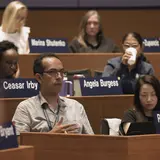
TAs Carry on EMBA Tradition of Learning from Peers
Knowledge-sharing has long been a hallmark of the MBA for Executives program.
A big part of the MBA for Executives experience is learning from peers—both during and after the two-year program. Many EMBA alums return to the classroom to act as teaching assistants for their favorite classes and professors, and one alum, Logan Bender ’19, even co-taught a course in fall 2021 with former SOM Dean Ted Snyder (watch a video of a master class modeled after the duo’s “Economic Analyses of High-Tech Industries”). Here, we asked second-years Marina Negroponte ’22 (pictured, left) and Jing Tu ’22 (right) about what drew them to serve as TAs, what they found most challenging, and what they learned.
How did you become a TA, and what did the position entail?
Marina Negroponte ’22: I moved back to the U.S. in 2016 after 25 years of living and working overseas in eight different states and their societies. I also did an immersion into the U.S. through corporate philanthropy and managing the Nevada State presidential primaries in 2020 for two candidates. When the State & Society class started, I wanted to formally get exposed to corporate political behavior and its management. The professor asked me to be the TA as a result of my practical experience, class performance, and generosity in sharing my perspective with the class.
For State & Society, my TA responsibilities were providing clarification on issues, tools, and interpretation of content for a firm’s political strategy; reinforcing the use and understanding of course content in written assignments; encouraging ethical thinking of a business’ political actions in the non-market environment; and grading participation and group and individual written assignments.
Jing Tu ’22: Professor Ibbotson promised me a signed book for winning the stock trading game during his class. It was a pity his entire class was held virtually during the most difficult COVID times, and I never found a good chance to collect the book in person. Eventually, I shamelessly sent him a polite email for the book with my mailing address attached. To my ecstasy, the Professor not only offered me the signed book right away but also asked me to be one of his TAs for first-years in the Class of 2023!
My responsibilities as TA for The Investor class included providing game strategy support to students for the class’ Stock Trading Game; providing clarification on financial concepts, terminologies, formulas, and calculations; hosting TA review sessions to review homework assignments; and grading group homework assignments and the final exam.
What motivated you to be a TA?
Negroponte: Personally, my parents are teachers. My mom researches and publishes. My dad is a practitioner. This combo allows lively discussions about society around the dinner table. This structure is similar to the State & Society course, with a professor teaching cutting-edge research and tools and a class of practitioners, emerging leaders in their fields. As a practitioner myself, I came back to school to get formally exposed to the levers firms use to navigate an increasingly complex social and political business environment. The TA-ship was an important step in that process.
Tu: A great professor, a great class, and an excellent opportunity to connect with first-years. I work in the pharmaceutical industry and had no financial background when I entered the program. One of the goals I set for myself was to be able to invest my savings after learning the core curriculums from the program. What can be more exciting than learning investment from Roger Ibbotson? The answer is learning from him twice.
What was the best part of the experience?
Negroponte: I enjoyed all the ideas from the class’ discussion posts and written assignments. Their perspectives continued to open mine. I am also taking Prof. Sonnenfeld’s Strategic Leadership Across Sectors course this spring in tandem, and revisiting the State & Society material with perspective from Sonnenfeld’s class was mutually reinforcing. It took the concept of integrated curriculum to another level for me.
Tu: Can I say everything? I enjoyed the interactions with the class and the pressure I felt to review and relearn everything to prepare for the TA office hour—not to mention, the 12-hour final grading party is the best. I would say that’s the happiest I’ve ever been to work overtime.
What was challenging about being a TA?
Negroponte: Prof. Katic has the latest knowledge and data related to corporate political behavior and the ever-changing policy, regulatory, and social climate in which firms operate. I think the biggest challenge is how to effectively translate how corporate forces can affect and change the playing fields for their industries—for better or worse—through their non-market strategies. Leaders who focus primarily on profit will stick to the market strategy, and leaders who have the ability to focus more broadly on prosperity understand and learn the non-market strategy. Yale has room for both.
Tu: Explaining investment concepts and problem sets to fellow classmates who have zero or very little financial background is always challenging. The class is very fast-paced. The speed presents an exciting challenge for both the class and the TAs to thoroughly digest the material and translate it less abstractly. It is also an honor to be given the full authority to come up with the answer keys for each problem set and the final exam. This practice really pushed me to relearn everything at a different level.



